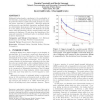114 search results - page 3 / 23 » Structuring unreliable radio networks |
UIC
2007
Springer
13 years 11 months ago
2007
Springer
Abstract. Recent experimental studies have shown that radio links between low-power devices are extremely unreliable. In particular, the instability and unpredictability of low-pow...
IPCCC
2007
IEEE
13 years 11 months ago
2007
IEEE
For economic reasons sensor networks are often implemented with resource constrained micro-controllers and low-end radio transceivers. Consequently, communication is inherently un...
AINA
2007
IEEE
13 years 9 months ago
2007
IEEE
Abstract--Monitoring and automatic control of building environment is a crucial application of Wireless Sensor Network (WSN) in which maximizing network lifetime is a key challenge...
TCOM
2010
13 years 3 months ago
2010
Abstract—This paper considers an uplink time division multiple access (TDMA) cognitive radio network where multiple cognitive radios (secondary users) attempt to access a spect...
IWCMC
2006
ACM
13 years 11 months ago
2006
ACM
Multipath fading heavily contributes to the unreliability of wireless links, causing fairly large deviations from link quality predictions based on path loss models; its impact on...

